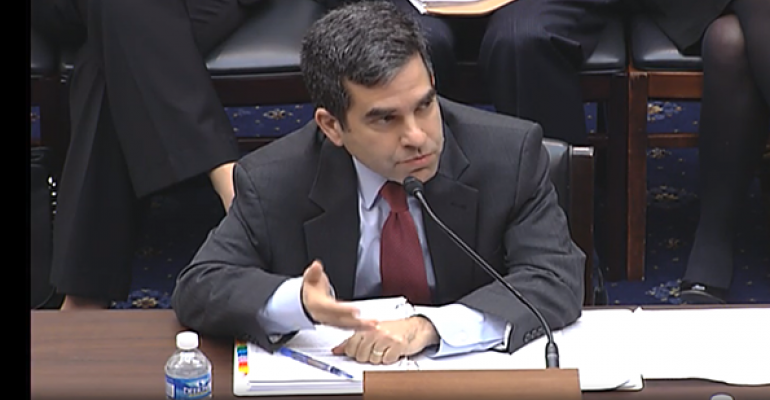The Securities and Exchange Commission’s increased used of its internal administrative court came under fire Thursday, as Republications raised questions about this venue’s ability to maintain due process and objectivity.
“While bringing more cases through the administrative proceedings can lead to lower costs for the agency and increases in efficiency, it’s important to realize that those benefits come with a cost. The cost is less due process protections for defendants,” Rep. Scott Garrett (R-N.J.) said in his opening remarks at the House Financial Services Committee hearing.
“Because the SEC’s administrative proceedings use the SEC’s procedural rules, respondents are forced to operate on a condensed timeframe and do not have the benefit of some of the fundamental due process protections under federal civil procedures,” Garrett added, noting that right to a jury trial, the exclusion of hearsay evidence and full discovery are among the rights excluded in the SEC’s in-house proceedings.
The interrogation by the House committee came following a lawsuit filed last month by Atlanta-based investment advisory firm Gray Financial Group, claiming the SEC’s administrative proceedings are unconstitutional.
Gray Financial claims it has been the target of an SEC investigation since at least August 2013, but the agency has not yet initiated a formal case. One of its complaints is that the President is unable to remove an administrative law judge.
Rep. Sean Duffy (R-Wis.) also hammered the agency’s head of enforcement, Andrew Ceresney, over the fairness of administrative law proceedings. Duffy questioned the SEC’s track record in these hearings, in which it won 100 percent of its cases last year.
“You won every case. How about with regard to the cases you brought in federal court? One hundred percent there? No, you won 11 out of 18 [cases]. You think there could be any correlation when you actually hire the judges, and you set the rules, that you win all the cases?” Duffy asked somewhat sarcastically.
Duffy also probed the objectivity of the proceedings when they allow hearsay to be admitted as evidence.
“Hearsay that is not subject to an exception is not admissible [in a district court proceeding],” Ceresney conceded, noting that the rules are “relaxed” around this issue in an administrative proceeding.
Administrative proceedings is legal process that the SEC has used for years, but it’s authority was expanded under Dodd-Frank to allow the agency to obtain penalties against non-registered individuals and companies. Prior to that, the SEC could only obtain those penalties in district court cases.
Last year, the SEC brought 43 percent of its cases though administrative proceedings, while 57 percent of SEC cases were litigated in district court, he reported.
Cases around a failure to supervise are among the ones that may be tried as an administrative proceeding instead of in federal court, as well as those that are seeking relief quickly for harmed investors, since they can be tried faster than in district court.
“We are not afraid to try cases in federal court,” Ceresney said, adding the agency has won 11 of its last 13 jury trials in federal court. “We’re not shying away from using district court.”





